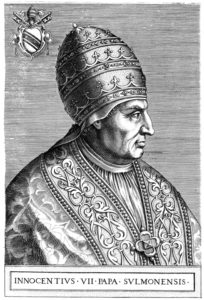
Innocent VII (1404-1406) 206th Pope
He had taken an oath to end the schism in any way possible
He was a man of great culture but of weak character
He failed to resolve the schism
He enlarged the faculties of Greek and Medicine
Gregory XII (1406-1415) 207th Pope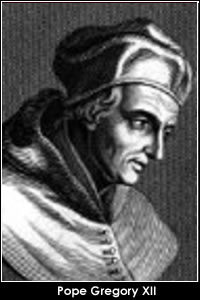
The Roman cardinals took an oath, that if elected, they would resign the tiara to bring reunion with Avignon
He notified Benedict X111 that he would abdicate if Benedict would also abdicate. Benedict refused
A council of cardinals deposed both popes and elected the next anti-pope Alexander V
Another anti-pope was selected
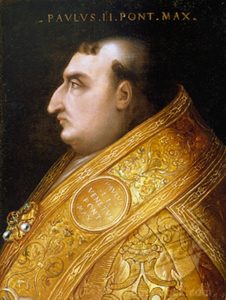
Martin V (1417-1431) 208th Pope
The council of Constance was, in a real sense, the ultimate governing authority of the Church for a short period of time
The papacy had been severely tarnished by the behavior of its multiple holders
The cardinals were blamed for the terrible state of affairs that had just ended
The state of the clergy was very poor in Europe because of poor supervision
Civil war in various places contributed to general unrest in Europe
The Turks were encroaching
The cardinals could not be trusted in electing a pope by themselves
Reform measures were passed by Church authorities
The council Fathers condemned Jan Hus, a Czech priest, who was a disciple of Wyclif
The fourteenth century left Rome and the Papal States in poor shape. The churches were neglect and is in disabuse. Mercenaries occupied portions of the city
He immediately began work rebuilding Rome, bringing in artists and architects from Florence
He was dealing with the idea that church councils becoming more superior to the popes (Conciliarism)
This time began the beginning of the Renaissance
For the first time a “holy door” was opened in the basilica of St. John Lateran
Eugene IV (1431-1447) 209th Pope
He was extremely holy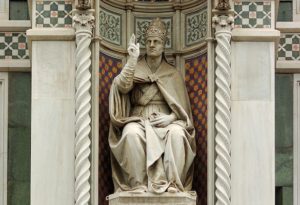
He had a hatred of nepotism, infuriating powerful families and cardinals
The Medici ruled the Humanist movement in Florence. The Humanists sought to base learning culture and learning upon the examples of Greece and Rome
A Christian movement advocated giving the Eucharist and cup to the laity. (Calixtines, “men of the cup” Calix-L. chalice, cup
The Turks were probing the Danube frontier pressuring Constantinople
The council ruled that the pope was superior to the council
Those opposed elected an anti-pope Felix V
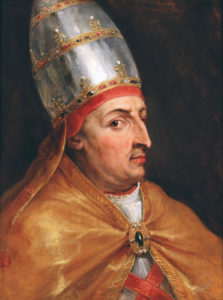
Nicholas V (1447-1455) 210th Pope
He became friendly with some of the leading Humanists of his time
He had an immense learning and administrative skills
He loved learning and the arts
He resolved to make Rome a center of Humanism, of beauty and knowledge
He is credited for the Vatican library and the current appearance of the Papal palace
He called a Jubilee year in 1450
He quashed the proceedings against St. Joan of Arch, paving the way for her canonization
Mass was preached to open air assemblies. Countless people of all ages returned to the practice of the Faith and reception of the sacraments
The Sultan was now master of the Balkans, outside Constantinople
Few in the west responded to the Eastern emperor’s plea for help against the Turks
The Turks overtook Constantinople
The eastern Emperor’s daughter married the prince of Muscovy. She brought her imperial throne in dowry. From this time, Muscovite rulers called themselves “Tsar” (Emperor, becoming practical heads of Eastern Orthodoxy
He began construction of the present St. Peter’s basilica
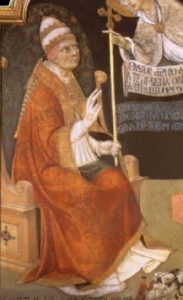
Callixtus III (1455-1458) 211st Pope
He was renowned for his penitential lifestyle and humble manner
His first interest was to pursue the Crusade and free Constantinople
He ordered the universal ringing of bell at noon everyday
He brought about the growth of Christianity in Sweden, Norway, and Denmark
He instituted the feast of the Transfiguration
Pius II (1458-1464) 212th Pope
He had live a past immoral life
He put his efforts in promoting a crusade
He found that the petty and personal strife of Europe was important to the continent’s rulers than their sworn obligations to the Church
He was very reform minded
He issued legislation reforming monastic life

Paul II (1464-1471) 213rd Pope
He introduced elaborate carnival celebrations at Rome in imitation of his native Venice
He was in general a patron of Humanism
He fought various Manichean-style heretics
He ordered that only cardinals wear the read caps
Sixtus IV (1471-1484) 214th Pope
He was a Franciscan
He first interest was the crusade. However, there was little interest in this
He built the Sistine Chapel and the bridge across the Tiber river
Nepotism became his only major vice
He was a generous patron of the arts
He instituted Father’s day
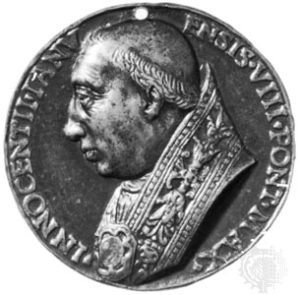
Innocent VIII (1484-1492) 215th Pope
He father children out of wedlock
He sought to launch a crusade
He confirmed the rights of Henry VII and his heirs to occupy the throne
He issued a bull against withcraft
Heresy was seen as a threat to individuals, communites, Church and state
He was known for his backing for witch hunting
Crime ran rampant in Rome
He assisted Columbus endeavor to discover the New World
Alexander VI (1492-1503) 216th Pope
He is seen as one of the worst popes

As a cardinal, he had a mistress
He had to deal with the question of the New World. Since membership in the Church was essential for salvation, he had to decide how to evangelize those natives
He divided the world into two parts. The Portugueese colonized the East Indes and Brazil. The Spanish would look after the rest of the New World and the Phillipines
The cultural divide between Brazil and the rest of Latin is attributed to him
He cracked down heavily on crime in Rome, laying the foundation for modern Rome’s police authority
He passed anti-witch and anti-black magic legislation
He encouraged Humanism
He encouraged the arts
